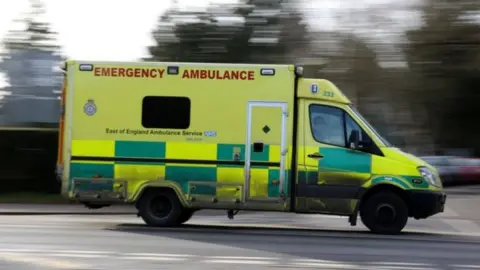Wells-next-the-Sea has longest wait for ambulances
 BBC
BBCCritically ill people in a coastal town wait the longest for an ambulance in Britain, figures have revealed.
People in Wells-next-the Sea in Norfolk wait on average 21 minutes, compared to the national rural average of 11 minutes for serious conditions such as heart attacks or breathing issues.
North Norfolk MP Norman Lamb said the emergency provision was "unacceptable".
East of England Ambulance Service NHS Trust (EEAST) said it was "challenging" to reach patients in rural areas.
The six-monthly figures from 2018, collated by the BBC from a Freedom of Information request, revealed six of the 10 postcode areas with the longest wait times were in mainly rural and coastal areas of Norfolk, Suffolk and Cambridgeshire.

Kevin Short volunteered as a community first responder (CFR) for three years in Wells, helping patients in the most serious emergencies before an ambulance arrived.
But he quit with stress, after having to wait for an ambulance "on numerous occasions with a very poorly patient for up to 50 minutes".
Mr Short, who runs a bed and breakfast in the town, said he wanted first responders to be better equipped and trained.
The closest ambulance station to Wells is 10 miles away in Fakenham, and the nearest acute hospital is 29 miles away King's Lynn.
"I'm very proud to have worked for the ambulance service for those three years, but from a personal level I have been left with deep scars," he said.

Sotak Robinson, manager of Dorrington House Care Home in Wells, said in four cases in the past six months, ambulances had taken longer than 25 minutes to arrive.
Three of the cases were for critical conditions and one person died 24 hours after being taken to hospital.
"It was one of the worst experiences that I've ever had with a resident," said Ms Robinson.
She did not blame the death on the ambulance trust, saying the service could have been stretched on that particular occasion.
But she said EEAST had to "understand this is somebody's life and time is of the essence."
Ambulances that take patients to hospital from Wells often do not return because they are diverted to another job nearby.
Mike Gate, chairman of Wells Town Council, said the town's new police station was built with a dedicated parking space for an ambulance, which never materialised.
"The parking space is there, but there's never been an ambulance on it."
 PA
PAMeanwhile Mr Lamb, a Liberal Democrat health minister between 2012 and 2015 in the coalition government, said while it was important to take geography into account, Wells was no further than other rural and coastal towns from a hospital.
Bude in Cornwall is an hour away from its nearest hospital, yet the average response time there was 15 minutes.
"The question is why the East of England Ambulance Service consistently fails to provide an effective service. The current situation is not acceptable," said the MP.
Dorothy Hosein, chief executive of EEAST, said dispatch teams were constantly moving resources around to keep cover as effective as possible.
"In rural areas such as Wells Next the Sea... it is challenging to maintain the same level of response we provide in more densely populated areas.
"We work hard to get to our sickest patients as quickly as we can," added Ms Hosein.
Wells-next-the-Sea is a popular seaside resort, which at the time of the 2011 census, had a mainly elderly population of 2,165 people.
